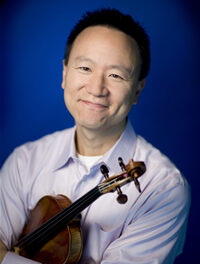A reviewer is really put on his mettle when there is no program and the performer says he’s not sure what he’s going to play and then improvises for an hour and a half. What’s to say when none of the music is at all recognizable except for “Summertime” from Porgy and Bess and one phrase from Bach’s unaccompanied cello sonatas? There are no odious comparisons to be made, no S. or Köchel numbers to fall back on, nor anything to be said about somebody’s peculiar gut-strung lutenfiskar.
So, bless his heart, the poor reviewer has to fall back on the performer and the music. If I had not been forewarned by the Internet about Claude Bourbon, I would have said the emperor was naked. Big and louche, clad all in black with harlequin stitched two-tone boots with stacked heels, lots of unkempt hair, a complexion between rosacea and hard weather, Bourbon ambled into the spindle-back delicacy of the faux silk gold draperies and culturally-self-conscious attendees of the Music House and ascended a stage repurposed from a conductor’s box, plopped himself down on a red brocade upholstered piano bench, leered out at the antediluvian audience (present company very much included), and offered a gravel-voiced throwaway “good afternoon,” just as if he were about to begin the mid-Sunday service announcements.
Bourbon began to play, sort of, in a puzzlingly tentative way, on a completely straightforward steel-strung guitar. He was just noodling quietly at first, as if trying a strange instrument. Finding it acceptable, he began to play more vigorously. He was wild and over-the top in a neat and precise way, intentionally Wildman Jack, with a collection of performance mannerisms and idiosyncrasies. He had his guitar on his knee and continually snatched it up against his body as if he had fallen asleep and was about to drop it. The violence of this allowed some interesting flexing of the pitch. As he played, he would relax his left hand, release the neck, and shake his fingers as if slinging off some noisome stuff or as if his fingers had fallen asleep.
Bourbon’s playing is by turns violent and delicate. His style includes tremendous extremes of loud and soft, of vicious flailing the strings and guitar body alternating with the most delicate and barely audible lute-like music. He has an impressive set of fingernails on his right fingers and especially on his thumb. About half of his playing was accompaniment to his own singing. His voice is harsh and rough, seemingly intentionally so. He ranged through all the possible iterations of the blues, with the standard AABA blues poetry. Almost all of his playing included a drumbeat percussion of his boot heel on the stage.
I suppose that most of what we heard was his own work, both music and lyrics, but who can say? He did sing his own version of Heyward/Gershwin’s “Summertime,” only the first verse, with a long and precise introduction, then singing, a rambling interlude, and the first verse repeated. For this one piece, Bourbon played slide guitar style with a steel “bottleneck” on his left ring finger, although he did not lay the instrument on his lap. That the ratcheting of the bottleneck on the frets was frequently louder than the playing was, like so much of Bourbon’s style, of no concern to him.
I hope I am not projecting too much when I say that Bourbon’s whiskey voice and vaguely lewd style and lyrics were not exactly what the Music House audience was expecting. Certainly the bright, flat lighting, gold draperies, and exotic Victorian decoration suggested an altogether different style of debauchery than that implied by Bourbon, who to my thinking would be more at home in the smoke-filled whiskey-perfumed atmosphere of the East Raleigh shot-houses of my youth. At intermission I was chatting with a Greenville church organist of my acquaintance and his wife. He mentioned that they had heard Bourbon at Fountain General Store and had looked forward to his performance at the Music House. For myself, I will look forward to An Evening of Schubert on October 29, 2016 at 7:00 p.m. with Jessie Wright Martin, mezzo-soprano; Leah Peroutka, violin; Chris Nunnally, cello; and the impresario himself, John O’Brien, piano.











